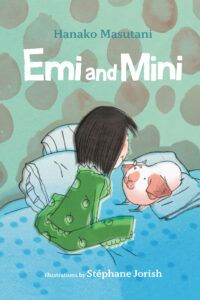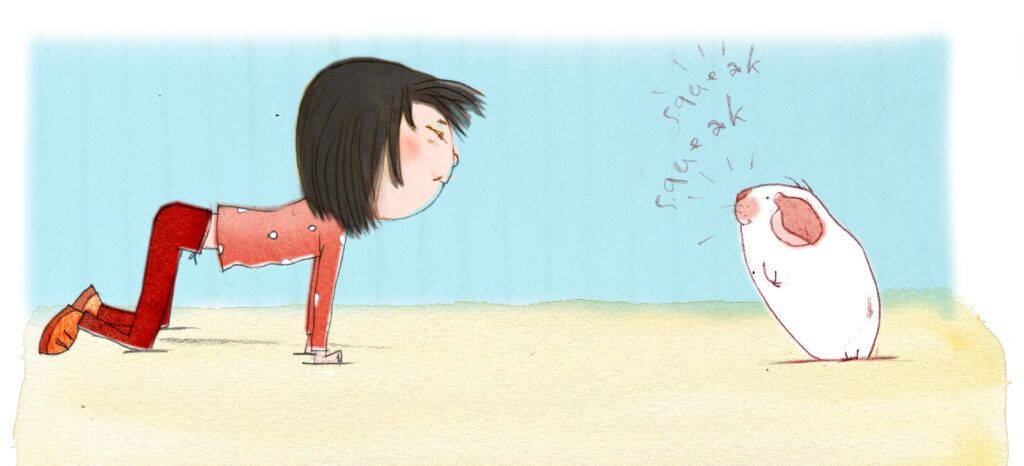A ‘timely and essential’ kids’ book
Emi and Mini
by Hanako Masutani (with illustrations by Stéphane Jorisch)
Vancouver: Tradewind Books, 2023
$21.95 / 9781926890203
Reviewed by Alison Acheson
*

“My birthday feels long. And flat. Like a squished loaf of bread”—from Emi and Mini, by Hanako Masutani
Emi and Mini, an early chapter book (grades 1-3) by Victoria’s Hanako Masutani, is a genuinely sustaining story for young readers, peopled with characters with whom I’d love to share a hot chocolate and come up with some imaginative play!
Masutani’s tale is emotional without being sentimental—a fine line for stories that want to share a quiet but resonant message about how to be at peace in our world, and with our world.
Somewhere, outside the edges of this story, stands the bigger scary world. But inside this story, a primary-school aged child can learn some life navigation skills without the didacticism that is often the tone of works for the young.
But it’s not a perfect world. Emi has had to leave her rural Island life in Comox, and has ended up in an apartment in the Big City on the mainland. Emi wants to share her birthday with her beloved cousins on the Island, but instead she has a Zoom birthday and ends up feeling left out. And Emi wants a dog. But ends up with a guinea pig; in spite of being the biggest guinea pig ever, a guinea pig is not a dog.

The bright lights and late nights of the city become mirrored in the activity of crepuscular Mini, who comes to life as the sun sets, snuffling in her cage and running on her wheel. Some bit of urban metaphor there for a reader to pick up on!
In many ways, the plot is predictable—at least, to an adult: girl wants pet; girl gets pet she doesn’t want; girl loses pet; girl finds pet and falls in love.
But it’s the details and the emotion, and the lovely and loving illustrations by Stéphane Jorisch (with endpapers replete with many Minis)! It’s a spot-on read, both for a newly independent reader, as an introduction to those glorious things known as chapter books, and also for a read-aloud, as it still holds the image-wonder of a picturebook. Emi and Mini works as a “bridging book” for those who are ready or almost ready. A young reader might move on to a longer chapter book after this, or feel equally comfortable about revisiting picturebooks; Emi and Mini makes no judgement on what end of the bridge one stands.
Some time ago—pre-Covid—it might have been a minority of people who have to wrangle with the economic challenges hinted at in these pages. But in these times, it’s becoming alarmingly normal for many to go without various things we’d grown accustomed to—birthday parties, for example, and gifts. Pets, too, judging by the extreme numbers currently left in shelters. So this book is timely and essential.
Emi’s mom demonstrates a constructive way to go through the world; she doesn’t assume that they won’t be allowed to have a pet in the apartment. She calls the landlord and asks. It’s a simple act, but illustrates the many sides of respect, and people working together. The landlord says yes, but with restrictions. It’s such real-world details that add layers to the story.

The tension in this story is that of real-world and day-to-day: others having power over us, and how we live with that. In the end, what is important? The love between Mom and Emi—so well evoked here—and the growing emotions and appreciation for the comfort of wee furry Mini. And the theme of losing before you fully understand the value of a thing, and in that loss piecing together bits of meaning and value. This is significant to navigating so much more throughout one’s life. The acceptance of what life does offer you is key.
Sometimes the roar of contemporary life is deafening, that scramble for More. From money to virtue-signalling, we’re hungry for the authentic and less. A quiet, well-considered story that reveals growth and connection is a meaningful piece to hold in hand. As Emi remarks, “Nighttime is magic, Mini and I agree. We chat as we look out at all the city lights. The lights smile back at us like visiting stars. I tell Mini she is one of my favourites, beautiful in some of the best ways—gentle, listening and twinkle-eyed.”
*

Alison Acheson is the author of almost a dozen books for all ages, with the most recent being a memoir of caregiving: Dance Me to the End: Ten Months and Ten Days with ALS (TouchWood, 2019). She writes a newsletter on Substack, The Unschool for Writers, and lives on the East Side of Vancouver. [Editor’s note: Alison Acheson has also reviewed books by Julie Lawson, George M. Johnson, Janice Lynn Mather, Jacqueline Firkins, Barbara Nickel, and Caroline Adderson for BCR; and Dance Me to the End: Ten Months and Ten Days with ALS was reviewed by Lee Reid.]
*
The British Columbia Review
Interim Editors, 2023-25: Trevor Marc Hughes (non-fiction), Brett Josef Grubisic (fiction)
Publisher: Richard Mackie
Formerly The Ormsby Review, The British Columbia Review is an on-line book review and journal service for BC writers and readers. The Advisory Board now consists of Jean Barman, Wade Davis, Robin Fisher, Barry Gough, Hugh Johnston, Kathy Mezei, Patricia Roy, Maria Tippett, and Graeme Wynn. Provincial Government Patron (since September 2018): Creative BC. Honorary Patron: Yosef Wosk. Scholarly Patron: SFU Graduate Liberal Studies. The British Columbia Review was founded in 2016 by Richard Mackie and Alan Twigg.
“Only connect.” – E.M. Forster